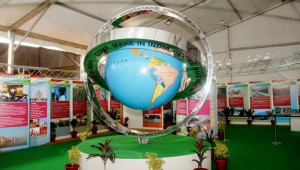Sunday Times 2
Mythology hijacks Indian science meet
[NEW DELHI] The 102nd Indian Science Congress which concluded last week (7 January) in Mumbai will be remembered more for non-science than for scientific discourse.

Image credit: Press Information Bureau, India
Media attention of the event focused around a session titled ‘Ancient Science Through Sanskrit’ with papers presented on mythical planes capable of inter-planetary travel and unproven claims of scientific breakthroughs in pre-history.
Jingoistic sounding claims were made by science and technology minister Harsh Vardhan that Indian mathematicians had discovered the Pythagoras theorem but passed it on to the Greeks.
“It is rather unfortunate that this one session got all the attention while several others were missed out on,” R. A. Mashelkar, former director-general of the Council of Scientific and Industrial Research, tells SciDev.Net.
Mashelkar also thinks it regrettable that while several Nobel laureates such as Ada E.Yonath, Paul Nurse and Randy Schekman attended the event they received scant attention in the media.
The Women’s Science Congress (WSC), a parallel feature since 2012, drew flak from delegates for poor organisation. Vineeta Bal, senior scientist, National Institute of Immunology, New Delhi, says: “Most attendees didn’t even know where it was being held – no website link, no information. It was invisible. Doing it for the sake of doing it is demeaning. We end up feeling more sidelined.”
There were spirited debates around such contentious topics as climate change and genetically modified (GM) crops. Delegates floated ideas like lifting tight regulatory measures on GM crops and challenged the idea that climate change was caused by human activity.
Mashelkar says one redeeming feature of the meet was the attempt to make it relevant to national agenda like Swaach Bharat (Clean India) promoted by prime minister Narendra Modi. “The session on Swachh Bharat had discussions on new innovations, and how science and technology can help achieve that goal,” he says.
The other national goal pushed by Modi, ‘Make in India’, also found focus in sessions on innovation. Mashelkar, who is on the advisory board of the Global Innovation Index (GII), says while India has a lot of innovative ideas it is lagging in innovations.
“We need a rigorous national innovation ecosystem if we want to succeed globally -we have slipped from rank 64 to 76 on the GII. India is definitely doing better and better but the question is not about how fast we are moving but how fast others are moving. The challenge is in competitiveness,” Mashelkar says.
Courtesy scidev.net

